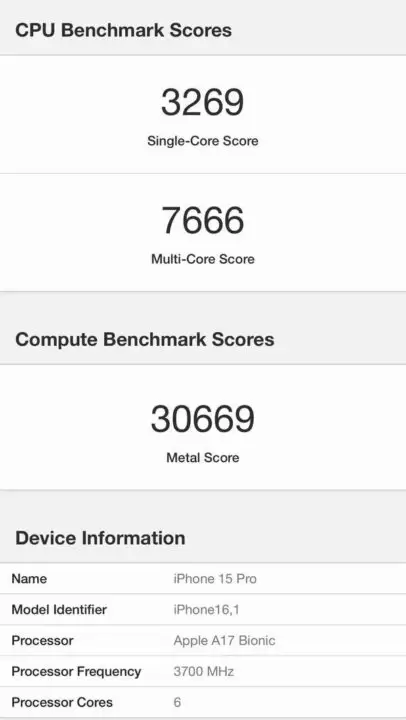Fresh insights into the capabilities of the Apple A17 Bionic SoC have surfaced through leaked Geekbench 6 test results. This revelation comes courtesy of a Twitter user with the handle @Naveen_tech_wala, who showcased benchmark scores supposedly extracted from the iPhone 15 Pro, equipped with this cutting-edge processor.
The Geekbench 6 tests paint an illuminating picture: the iPhone 15 Pro, powered by the Apple A17 Bionic, scored an impressive 3,269 points in single-core testing and an even more notable 7,666 points in multi-core performance.
These scores underscore a substantial leap from its predecessor, the A16 Bionic, which managed 2,531 and 6,460 points in the corresponding evaluations. Such strides signify an impressive 30% enhancement in single-core potency and an 18% upswing in multi-core capabilities.
The captured screenshot also provides a glimpse into the A17 Bionic’s inner workings, revealing its capacity to operate at speeds reaching up to 3.7 GHz.

Astonishing Progress Driven by TSMC’s 3nm Innovation In addition to the benchmark statistics, the A17 Bionic also excelled in the Geekbench computational test, amassing a noteworthy 30,669 points. This represents a substantial 36% advancement over its predecessor, the A16 Bionic, which clocked around 22,000 points in the same domain.
The root of this impressive leap can be attributed to various factors, including the incorporation of an extra GPU core. Crucially, credit is also due to TSMC’s innovation, as the processor leverages the prowess of the new N3B (3nm) architecture, transitioning from the preceding N4 (4nm) node.
However, it’s important to approach this revelation with caution, as it remains a leaked source and not an official confirmation. Thus, a discerning approach is advised until the details are officially unveiled. Nonetheless, these revelations offer a tantalizing glimpse into what Apple might unveil with the A17 Bionic SoC, with a more comprehensive understanding expected to surface during the impending official launch.

